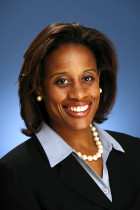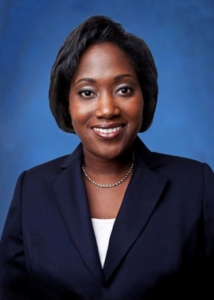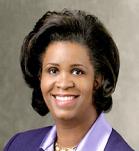 By Tina Vasquez, Managing Editor
By Tina Vasquez, Managing Editor
It wasn’t until Latrise Ashford was interviewing with Accenture that she realized technology consulting would be the perfect career choice for her, enabling her to be analytical and work directly with clients.
“A friend who interned at Accenture introduced me to the company and suggested I apply,” Ashford said. “I always knew I wanted to work in business, but wasn’t aware I could have a career in consulting.”
The Yale graduate is now Managing Director of Accenture’s Health and Public Service Practice. Since the early days of her career she has concentrated on information management.
“After receiving my first assignment analyzing and structuring new data sources, I knew I had made the right choice,” she said. “In my current role I work with data analysts and statisticians on a regular basis and love it. I may not have deliberately chosen this path, but I ended up in the perfect place for my skills and interests.”
Leveraging Assets
Currently, Ashford is focused on helping health & public service organizations become insight-driven by leveraging their best asset: data. By using data more effectively and efficiently, she says, these organizations can better help their communities and the citizens who depend on their services.
“I am committed to working with my clients in the public service sector and I’m passionate about finding solutions to problems that affect those who are most vulnerable in our society,” Ashford said. “The combination of my technical skills and love for creative problem solving has made my current position leading Intelligent Processing and Data Analytics in our Health & Public Service practice the perfect role for me.”
The Art of the Possible
The work the managing director does is new and cutting edge, with advanced analytics and new technologies quickly becoming the buzz in the market. But there are challenges.
“The challenge is that public service organizations often don’t have a lot of room for trying out new techniques and methods without the fear of impacting the lives of the citizens they serve. Balancing limited resources and increasing demand for services is something my clients deal with every day. Helping them understand the art of the possible – and how new technology plays into that – is my biggest challenge and a challenge I welcome,” Ashford said.
The work she did with the Administration for Children’s Services is among Ashford’s proudest career achievements. She spent four-years working with the agency to create a management reporting solution that provided a holistic view of children in the New York City foster care system.
“This tool was a powerful way to track key outcomes to get children and families reunited where appropriate,” she said. “I’m happy I played a role and am looking to create similar and even more advanced solutions for my clients.”
Work-Life Integration
Ashford’s schedule is jam packed and she admits that sometimes it can be overwhelming. But a long time ago she received a piece of advice that has stuck with her.
“Stop trying to strike work-life balance; focus more on work-life integration. I have learned that life may not always be balanced, but my work is very important to me and being able to achieve professional success while still being there for my family provides me with a sense of accomplishment, pride, and true fulfillment,” Ashford says.
Leading By Example
The managing director has equally good advice for young women considering a career in her field.
“Always strive to be an authentic leader; never lead in a manner that does not feel natural – working in this manner is simply not sustainable,” she said. “We spend a tremendous amount of time at work, and give our all to our colleagues, clients, and teams. We should enjoy what we do, and not feel we are forcing anything unnaturally.”
The newly-engaged Ashford knows a great deal about being a leader, too. She works with several NYC non-profits, assisting the under-served and most vulnerable citizens of the community. For the last 10 years she has also led the Metro NY African-American Employee Resource Group.
“I am amazed at the programs we’ve been able to organize and the impact we’ve made within Accenture and our communities,” she said. “This group has been a source of mentorship and camaraderie for me and I’m happy to play a leadership role. Watching the next generation of leaders take the torch and run with it also has been incredibly rewarding.”
A forward thinker, Ashford says she sets her sights on new goals every couple of years.
“I’m shaping my next big goal,” she said, “but for now it’s to be the best I can possibly be in creating viable, profitable, and most important, sustainable, business for Accenture.”
 RLJ Lodging Trust’s CFO, Leslie Hale, grew up in an entrepreneurial family and from an early age she says she was in love with the concept of taking one dollar and turning it into two. She was a natural. Whether it was getting chosen out of college for GE’s world renowned, ultra-competitive Financial Management Program or becoming a CFO at the age of 35, time and time again it’s been proven that she was born to thrive in the financial services industry.
RLJ Lodging Trust’s CFO, Leslie Hale, grew up in an entrepreneurial family and from an early age she says she was in love with the concept of taking one dollar and turning it into two. She was a natural. Whether it was getting chosen out of college for GE’s world renowned, ultra-competitive Financial Management Program or becoming a CFO at the age of 35, time and time again it’s been proven that she was born to thrive in the financial services industry.








